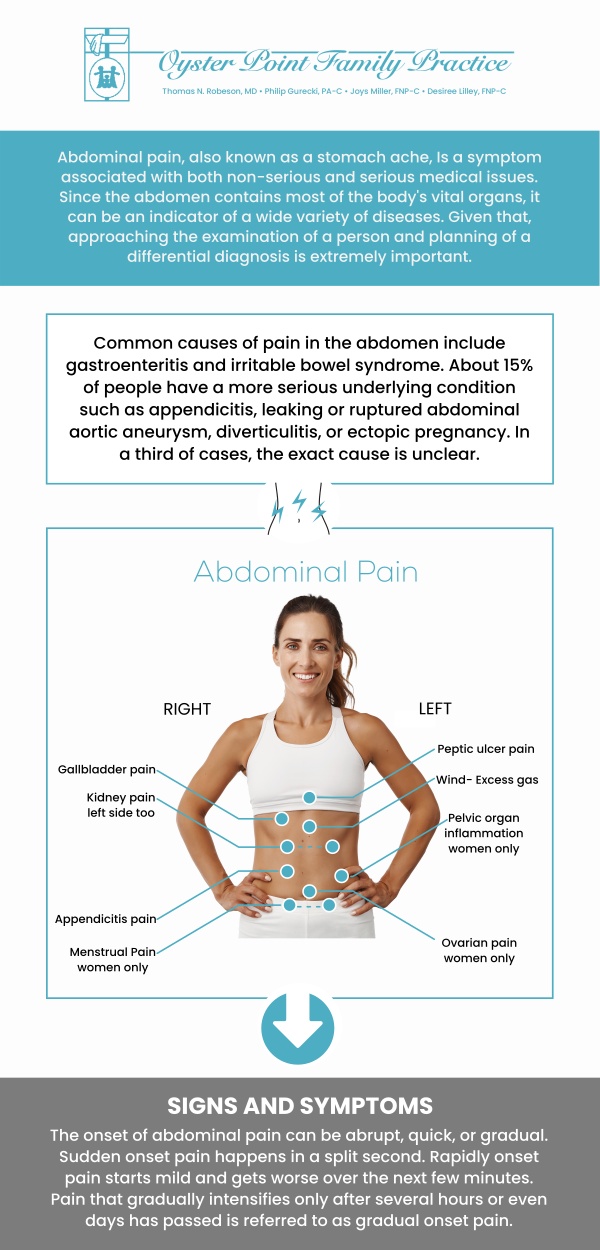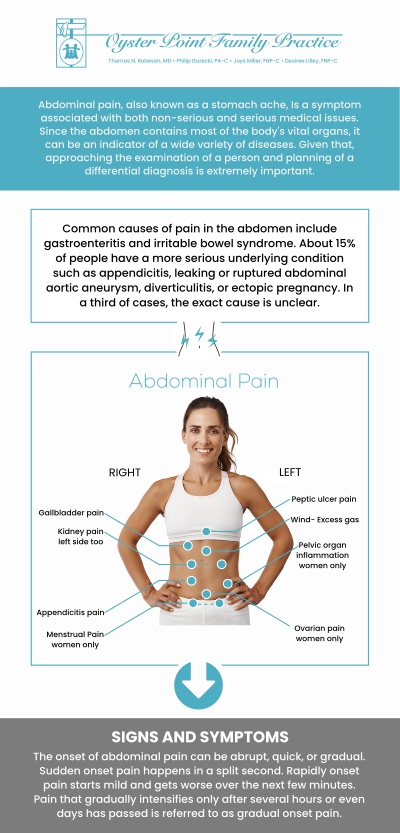What Causes Lower Abdominal Pain in Females?
Lower abdominal pain in females can stem from various conditions related to the reproductive system, such as menstrual cramps, ovarian cysts, or endometriosis, as well as issues with other organs like appendicitis or urinary tract infections. Consult Dr. Thomas N. Robeson, MD, and his dedicated team for proper diagnosis, especially if the pain is severe, persistent, or accompanied by other symptoms like fever, vomiting, or abnormal bleeding. For more information, please contact us or schedule an appointment online. We are conveniently located at 704 Thimble Shoals Blvd Suite 700, Newport News, VA 23606.


Table of Contents:
When should women see primary care for lower abdominal pain?
What are the common causes of lower abdominal pain in females, and when should I be concerned?
What are the symptoms of lower abdominal pain in females?
What lifestyle changes can help alleviate lower abdominal pain in females?
Comprehensive Care for Women’s Abdominal Health at Oyster Point Family Practice:
At Oyster Point Family Practice, we encourage women to schedule an appointment with our primary care providers if they experience lower abdominal pain that is severe, persistent, or getting worse over time. If your pain interferes with your daily activities, does not improve with over-the-counter medications, or is accompanied by symptoms such as fever, nausea, vomiting, unusual vaginal discharge, painful urination, blood in the urine or stool, or unexplained weight loss, it’s important to seek a medical evaluation with our experienced team.
Women who notice lower abdominal pain along with missed periods or abnormal vaginal bleeding should also reach out to Oyster Point Family Practice, as these symptoms may indicate gynecologic conditions that require timely attention. If you are pregnant—or think you may be—and develop lower abdominal pain, please contact us promptly, as some pregnancy-related complications can be serious and need immediate care.
We want to ensure your safety and well-being, so any sudden, sharp, or severe pain, or pain accompanied by fainting, dizziness, or shortness of breath, should be treated as a medical emergency. For any recurring or unexplained abdominal discomfort, regular check-ins with our primary care providers can help identify the cause and guide you toward the right treatment.
Lower abdominal pain is a common concern among women and can stem from a variety of causes—some minor and others more serious. At Oyster Point Family Practice, our experienced healthcare team is here to help you determine the cause of your discomfort and provide the care you need.
Common Causes We See Include:
• Menstrual cramps (dysmenorrhea): These often cause throbbing or cramping pain before or during your period.
• Ovulation pain (mittelschmerz): This brief, mid-cycle pain can be a normal part of your menstrual cycle.
• Digestive issues: Conditions like constipation, irritable bowel syndrome (IBS), or urinary tract infections (UTIs) can also lead to lower abdominal discomfort.
Other Gynecological and Medical Conditions:
Our team is experienced in diagnosing and managing more complex causes, such as:
• Ovarian cysts
• Endometriosis
• Pelvic inflammatory disease (PID)
• Pregnancy-related issues (including early pregnancy, ectopic pregnancy, or miscarriage)
• Appendicitis, hernias, or gastrointestinal infections (less common, but important to rule out)
Early diagnosis and treatment can prevent complications and ensure you receive the most appropriate care. At Oyster Point Family Practice, we are committed to providing compassionate and thorough evaluations for all women experiencing lower abdominal pain.
Lower abdominal pain is a common concern among women and can have a variety of causes, each presenting with different symptoms. At Oyster Point Family Practice, we frequently see patients with pain that may feel dull, aching, or sharp, and is typically located below the belly button. This discomfort can be constant or come and go, and sometimes radiates to the lower back or thighs. Additional symptoms like bloating, cramping, or a sense of fullness are also common.
You may notice changes in your bowel habits, such as constipation or diarrhea, alongside your abdominal pain. Some women experience changes in their menstrual cycles, including heavier or irregular periods, pain during menstruation (dysmenorrhea), or spotting between cycles. Pain during sexual intercourse or while urinating, as well as symptoms like nausea, vomiting, fever, or unusual vaginal discharge, can sometimes indicate infection or inflammation.
Because lower abdominal pain can signal a range of conditions—from digestive issues to gynecological concerns—it’s important to talk with your healthcare provider.
While a thorough evaluation by your healthcare provider is important for persistent or severe symptoms, certain lifestyle changes may help alleviate mild discomfort and reduce the frequency of symptoms.
Healthy Habits for Abdominal Comfort:
• Eat a Balanced Diet: Consuming plenty of fiber, fruits, and vegetables can help prevent constipation—a common cause of abdominal pain. Our providers can offer nutritional guidance tailored to your needs.
• Stay Hydrated: Drinking enough water throughout the day supports healthy digestion and can minimize bloating or cramping.
• Be Active: Regular physical activity regulates bowel movements, improves circulation, and reduces stress, all of which may help with abdominal discomfort. We can help you create an exercise plan that fits your lifestyle.
Manage Stress Effectively
• Stress can worsen abdominal pain or trigger conditions like irritable bowel syndrome (IBS). Techniques such as deep breathing, yoga, or meditation may offer relief.
Track Your Cycle and Symptoms
Keeping a record of your menstrual cycle and symptoms can help you and your provider identify patterns or triggers for abdominal pain. Using heat therapy, such as a warm compress or heating pad, during your period may provide comfort.
• Avoid foods and drinks that tend to cause bloating or irritation, like caffeine, carbonated beverages, and highly processed foods.
Promote Urinary and Reproductive Health
• Good personal hygiene and wearing breathable, cotton underwear can help prevent infections that might cause lower abdominal pain.
• If you have a specific diagnosis, such as endometriosis or polycystic ovary syndrome (PCOS), our team can work with you to develop a personalized lifestyle and treatment plan.
As a family practice physician at Oyster Point Family Practice, Dr. Thomas Robeson‘s approach to diagnosing lower abdominal pain in women differs from a specialist’s by emphasizing a holistic, patient-centered, and comprehensive evaluation. He leverages his understanding of your overall health and medical history, rather than focusing on a single system or area. This allows for a more thorough exploration of potential causes, not limited to gynecological issues.
While these lifestyle tips can help with mild or occasional discomfort, ongoing, severe, or worsening pain should always be evaluated by a healthcare professional. At Oyster Point Family Practice, we are here to help you identify the cause of your symptoms and provide the care you need. If you have concerns about lower abdominal pain, contact us or schedule an appointment online. We are conveniently located at 704 Thimble Shoals Blvd Suite 700, Newport News, VA 23606. We serve patients from Newport News VA, Grafton VA, Hampton VA, Poquoson VA, Seaford VA, Carrollton VA, and surrounding areas.
Check Out Our 5 Star Reviews


Additional Services You May Need
• Annual Physicals
• Sick Visits
• Chronic Care Management
• Well Child Visits
• Women’s Health
• Blood Glucose Monitoring
• Bone Densitometer Testing (Dexa Scan)
• Pulse Oximetry Testing
• Pulmonary Function Testing
• Gynecology
• Newborn Care
• Acute Conditions
• Flu Shots
• School Physicals
• Minor Surgeries
• Chronic Conditions
• Physicals
• Covid-19 Vaccine Information
• Pre Operation Clearance Physicals
• Auto Accident Injury
• Cuts and Bruises
• Sprains & Strains
• Same Day Sick Visits
• Immunizations – Tdap
• MMR
• IPV
• Diabetes Management
• Pneumonia
• Shingrix
• Childrens Vaccines
• Walk-in Lab Services
• Women’s Physicals
• Men’s Physicals
• Sports Physicals
• PAP Smears
• COPD
• Geriatric Care
• Travel Medicine Clinic
• Osteoporosis
• Immunizations

Additional Services You May Need
• Annual Physicals
• Sick Visits
• Chronic Care Management
• Well Child Visits
• Women’s Health
• Blood Glucose Monitoring
• Bone Densitometer Testing (Dexa Scan)
• Pulse Oximetry Testing
• Pulmonary Function Testing
• Gynecology
• Newborn Care
• Acute Conditions
• Flu Shots
• School Physicals
• Minor Surgeries
• Chronic Conditions
• Physicals
• Cuts and Bruises
• Sprains & Strains
• Same Day Sick Visits
• Immunizations – Tdap
• MMR
• IPV
• Diabetes Management
• Pneumonia
• Shingrix
• Childrens Vaccines
• Walk-in Lab Services
• Women’s Physicals
• Men’s Physicals
• Sports Physicals
• PAP Smears
• COPD
• Geriatric Care
• Travel Medicine Clinic
• Osteoporosis
• Immunizations
• Covid-19 Vaccine Information
• Pre Operation Clearance Physicals
• Auto Accident Injury


